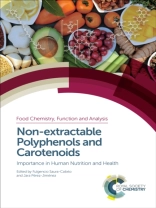Polyphenols and carotenoids are abundant in fruits, vegetables, herbs and spices, and beverages, such as tea, cocoa and wine providing health-related benefits and antioxidant properties. Focusing on non-extractable polyphenols and carotenoids that are present in the diet, this book will improve our knowledge of dietary intakes and physiological properties ensuring a better understanding of their potential health effects.
With global appeal, this will be the first book dedicated to raising the profile of this important area. Summarising the current knowledge in the field, the book will direct further research for food chemists, scientists and nutritionists looking for new perspectives.
表中的内容
The Story of the Introduction of Non-extractable Polyphenols into Polyphenol Research: Origin, Development and Perspectives; Dietary Fiber and Non-extractable Polyphenols; Extractable and Non-extractable Polyphenols: an Overview; Analysis of Non-extractable Polyphenols (NEPP); Dietary Sources and Intakes of Non-extractable Polyphenols; Non-extractable Polyphenols in Tropical Fruits: Occurrence and Health-related Properties; Fruit and Vegetable Processing: Effects on Extractable and Non-extractable Polyphenols; Carotenoids: Concept, Dietary Sources and Structure–Activity Relationships for Antioxidant and Health-related Properties; Metabolic Fate of Bioaccessible and Non-bioaccessible Carotenoids; Models for Studying Polyphenols and Carotenoids Digestion, Bioaccessibility and Colonic Fermentation; Metabolic Fate of Extractable and Non-extractable Polyphenols; Non-extractable Polyphenols and the Gut Microbiome; Antioxidant Capacity of Non-extractable Polyphenols as a Key Dietary Parameter; Non-extractable Polyphenols in Fruit: Distribution, Changes, and Potential Health Effects; In vivo Studies of Nonextractable Polyphenols: a Case Study with Grape Products; Sorghum Non-extractable Polyphenols: Chemistry, Extraction and Bioactivity; Non-extractable Phenolic Compounds as Food Ingredients; Concluding Remarks












